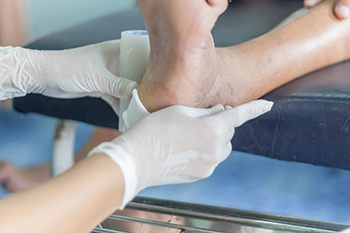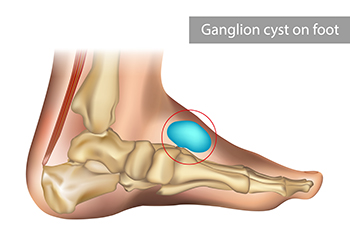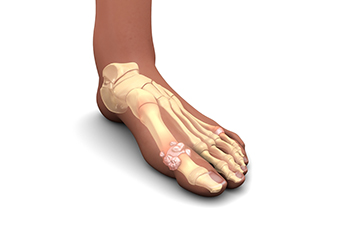
Complications from foot wounds can be serious in patients who have diabetes. When blood sugar levels are too high, the blood vessels can narrow and arteries can stiffen. This blocks blood flow, oxygen, and important nutrients needed to help heal wounds. Wounds can become infected and the compromised immune system in diabetics may not be able to fight it. This type of infection can spread to soft tissue, bone, and blood, which could lead to sepsis. Neuropathy is common among diabetics which is a condition that damages the nerves in the legs and feet. Neuropathy may lead to a loss of sensation, making it difficult to feel foot problems arising. Neuropathy can also make it difficult to walk and increased pressure can be put on certain parts of the feet to help diabetics sense the floor. This pressure can cause skin to break down and ulcers to form. Closely monitoring blood sugar levels and wearing protective and well-fitting shoes may help diabetic patients in preventing abrasions from developing on their feet. If you have diabetes, it is strongly suggested that you include a podiatrist on your healthcare team. This medical professional can routinely examine your feet and help you keep on top of any issues that might emerge.
Wound care is an important part in dealing with diabetes. If you have diabetes and a foot wound or would like more information about wound care for diabetics, consult with Genine Befumo, DPM from University Foot and Ankle Center, L.L.C. Our doctor will assess your condition and provide you with quality foot and ankle treatment.
What Is Wound Care?
Wound care is the practice of taking proper care of a wound. This can range from the smallest to the largest of wounds. While everyone can benefit from proper wound care, it is much more important for diabetics. Diabetics often suffer from poor blood circulation which causes wounds to heal much slower than they would in a non-diabetic.
What Is the Importance of Wound Care?
While it may not seem apparent with small ulcers on the foot, for diabetics, any size ulcer can become infected. Diabetics often also suffer from neuropathy, or nerve loss. This means they might not even feel when they have an ulcer on their foot. If the wound becomes severely infected, amputation may be necessary. Therefore, it is of the upmost importance to properly care for any and all foot wounds.
How to Care for Wounds
The best way to care for foot wounds is to prevent them. For diabetics, this means daily inspections of the feet for any signs of abnormalities or ulcers. It is also recommended to see a podiatrist several times a year for a foot inspection. If you do have an ulcer, run the wound under water to clear dirt from the wound; then apply antibiotic ointment to the wound and cover with a bandage. Bandages should be changed daily and keeping pressure off the wound is smart. It is advised to see a podiatrist, who can keep an eye on it.
If you have any questions, please feel free to contact our office located in Monroe Township, NJ . We offer the newest diagnostic and treatment technologies for all your foot care needs.

A ganglion cyst on the foot develops near joints or tendons, of which there are many in the foot. It is like a soft pebble filled with a gel-like fluid and is noncancerous. In many cases, a ganglion cyst will disappear or gradually diminish in size, despite the fact it can be quite painful and tender to the touch. Symptoms of a ganglion cyst are a noticeable lump, a tingling or burning pain if it touches a nerve, and irritation that can happen while wearing shoes. A ganglion cyst forms when synovial fluid leaks from a joint or tendon and collects in a sac under the skin. If it is particularly painful and interferes with the completion of your daily activities, a podiatrist can drain the cyst of its fluid and inject it with medication. It is very dangerous to try to pop a ganglion cyst yourself, as this may cause further damage and increase the risk of infection. In severe cases, surgery can be an option. For help with a ganglion cyst on the foot, it is suggested that you make an appointment with a podiatrist who can determine the best options to treat a ganglion cyst.
Foot Pain
Foot pain can be extremely painful and debilitating. If you have a foot pain, consult with Genine Befumo, DPM from University Foot and Ankle Center, L.L.C. Our doctor will assess your condition and provide you with quality foot and ankle treatment.
Causes
Foot pain is a very broad condition that could be caused by one or more ailments. The most common include:
- Bunions
- Hammertoes
- Plantar Fasciitis
- Bone Spurs
- Corns
- Tarsal Tunnel Syndrome
- Ingrown Toenails
- Arthritis (such as Gout, Rheumatoid, and Osteoarthritis)
- Flat Feet
- Injury (from stress fractures, broken toe, foot, ankle, Achilles tendon ruptures, and sprains)
- And more
Diagnosis
To figure out the cause of foot pain, podiatrists utilize several different methods. This can range from simple visual inspections and sensation tests to X-rays and MRI scans. Prior medical history, family medical history, and any recent physical traumatic events will all be taken into consideration for a proper diagnosis.
Treatment
Treatment depends upon the cause of the foot pain. Whether it is resting, staying off the foot, or having surgery; podiatrists have a number of treatment options available for foot pain.
If you have any questions, please feel free to contact our office located in Monroe Township, NJ . We offer the newest diagnostic and treatment technologies for all your foot care needs.

Gout is a particular kind of foot affliction that is essentially a form of inflammatory arthritis. In particular, gout is often characterized by pain in the joints of the feet. There are specific types of foods that are either good or bad for increasing the risk of gout. Importantly, plant-based foods can decrease the risk of triggering a gout attack. The reason for this is that plant-based foods are especially low in purines. There are many different types of plant-based foods. The list includes beans, seeds, nuts, vegetables, and whole grains. If you are someone that has gout attacks, it is suggested that you schedule an appointment with a podiatrist who can help you to find relief and manage this painful condition.
Gout is a foot condition that requires certain treatment and care. If you are seeking treatment, contact Genine Befumo, DPM from University Foot and Ankle Center, L.L.C. Our doctor will treat your foot and ankle needs.
What Is Gout?
Gout is a type of arthritis caused by a buildup of uric acid in the bloodstream. It often develops in the foot, especially the big toe area, although it can manifest in other parts of the body as well. Gout can make walking and standing very painful and is especially common in diabetics and the obese.
People typically get gout because of a poor diet. Genetic predisposition is also a factor. The children of parents who have had gout frequently have a chance of developing it themselves.
Gout can easily be identified by redness and inflammation of the big toe and the surrounding areas of the foot. Other symptoms include extreme fatigue, joint pain, and running high fevers. Sometimes corticosteroid drugs can be prescribed to treat gout, but the best way to combat this disease is to get more exercise and eat a better diet.
If you have any questions please feel free to contact our office located in Monroe Township, NJ . We offer the newest diagnostic and treatment technologies for all your foot and ankle needs.
Blog Archives
- April 2024
- March 2024
- February 2024
- January 2024
- December 2023
- November 2023
- October 2023
- September 2023
- August 2023
- July 2023
- June 2023
- May 2023
- April 2023
- March 2023
- February 2023
- January 2023
- December 2022
- November 2022
- October 2022
- September 2022
- August 2022
- July 2022
- June 2022
- May 2022
- April 2022
- March 2022
- February 2022
- January 2022
- December 2021
- November 2021
- October 2021
- September 2021
- August 2021
- July 2021
- June 2021
- May 2021
- April 2021
- March 2021
- February 2021
- January 2021
- December 2020
- November 2020
- October 2020
- September 2020
- August 2020
- July 2020
- June 2020
- May 2020
- April 2020
- March 2020
- February 2020
- January 2020
- December 2019
- November 2019
- October 2019
- September 2019
- August 2019
- July 2019
- June 2019
- May 2019
- April 2019
- March 2019
- February 2019
- January 2019
- December 2018
- November 2018
- October 2018
- September 2018
- August 2018
- July 2018
- June 2018
- May 2018
- April 2018
- March 2018
- February 2018
- January 2018
- December 2017
- November 2017
- October 2017
- September 2017
- August 2017
- July 2017
- June 2017
- May 2017
- April 2017
- March 2017
- February 2017
- January 2017
- December 2016
- November 2016
- October 2016
- September 2016
- August 2016
- July 2016
- June 2016
- May 2016
- April 2016
- March 2016
- February 2016
- January 2016
- December 2015
- November 2015
- October 2015
- September 2015
- August 2015
- July 2015
- June 2015
- May 2015
- April 2015
- March 2015
- February 2015
- January 2015
- December 2014
- November 2014
- October 2014
- September 2014
- August 2014
- July 2014





